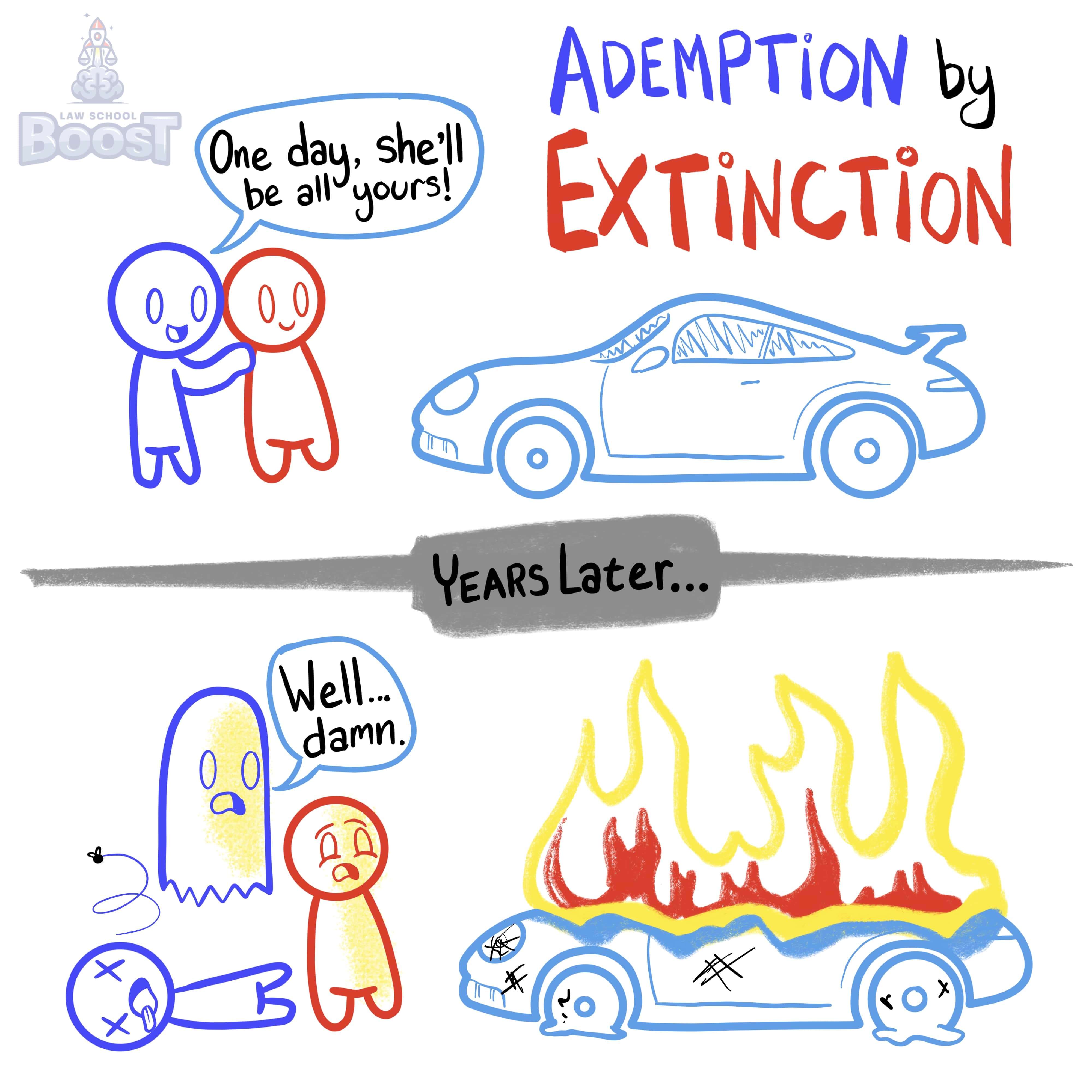😭
Wills • Changes in Beneficiaries
WILLS#038
Legal Definition
Ademption by extinction is the failure of a gift caused that is caused when an item of property originally intended to be gifted is no longer owned by the testator upon their death.
Plain English Explanation
Imagine if Bob wrote a will that left his Ferrari sports car to Sam. However, one day, while Bob is driving his Ferrari, he drives off a cliff and dies in a fiery explosion. Not only does Bob no longer exist, but neither does the Ferrari. So what happens to Bob's will, which still says Sam gets the Ferrari? The court can't put the Ferrari back together, nor can it force the estate to buy Sam a new one. Because the Ferrari no longer exists, the gift fails, and Sam gets nothing. Ademption doesn't always require a fiery explosion (though its much cooler when it does). It can also apply if a testator simply doesn't own a piece of property anymore at the time of their death.
Note that this only affects specific legacies that identify specific gifts. A general legacy cannot fall victim to ademption since it applies, generally, to money existing within the estate.
Note that this only affects specific legacies that identify specific gifts. A general legacy cannot fall victim to ademption since it applies, generally, to money existing within the estate.
Hypothetical
Hypo 1: Bob writes a will leaving his prized vintage car to Sam. Later, Bob sells the car to pay off debts. When Bob passes away, Sam finds out he can't get the car. Result: This is ademption by extinction. Since Bob no longer owns the car at his death, Sam cannot receive it as a gift.
Hypo 2: In his will, Bob leaves his expensive watch to Sam. However, the watch is stolen a year before Bob dies. Result: Again, this is ademption by extinction. Because the watch was stolen and no longer owned by Bob at his death, the gift to Sam is void.
Hypo 3: Bob leaves his house to Sam in his will. Bob later sells the house and buys a new one. At his death, Sam expects to get the new house. Result: Sam will not receive the new house. Ademption by extinction applies because the specific house left to Sam is no longer part of Bob's estate.
Hypo 4: Bob's will leaves “my current vehicle” to Sam. At the time of writing, it's a Honda. Bob later sells the Honda and buys a Toyota. When Bob dies, Sam wants the Toyota. Result: Sam is entitled to the Toyota. The phrase “my current vehicle” refers to whatever vehicle Bob owned at the time of his death, not at the time the will was written. Since Bob’s “current vehicle” at the time of his death was the Toyota, Sam inherits the Toyota, even though Bob originally owned a Honda when the will was written.
Hypo 2: In his will, Bob leaves his expensive watch to Sam. However, the watch is stolen a year before Bob dies. Result: Again, this is ademption by extinction. Because the watch was stolen and no longer owned by Bob at his death, the gift to Sam is void.
Hypo 3: Bob leaves his house to Sam in his will. Bob later sells the house and buys a new one. At his death, Sam expects to get the new house. Result: Sam will not receive the new house. Ademption by extinction applies because the specific house left to Sam is no longer part of Bob's estate.
Hypo 4: Bob's will leaves “my current vehicle” to Sam. At the time of writing, it's a Honda. Bob later sells the Honda and buys a Toyota. When Bob dies, Sam wants the Toyota. Result: Sam is entitled to the Toyota. The phrase “my current vehicle” refers to whatever vehicle Bob owned at the time of his death, not at the time the will was written. Since Bob’s “current vehicle” at the time of his death was the Toyota, Sam inherits the Toyota, even though Bob originally owned a Honda when the will was written.
Visual Aids



